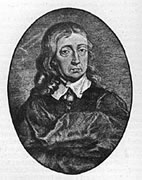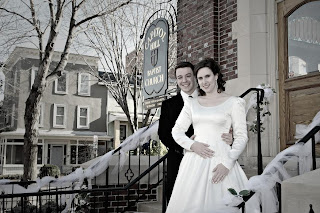On this day in literature . . .

. . . John Milton was born in London, 1608. At the age of 42, he lost his sight (an affliction which Sonnet 19 below addresses). He would later produce the greatest English epic, Paradise Lost.
Excerpts from the opening lines of Paradise Lost:
Of man's first disobedience, and the fruit
Of that forbidden tree, whose mortal taste
Brought death into the world, and all our woe,
With the loss of Eden, till one greater Man
Restore us, and regain the blissful seat,
Sing Heav'nly Muse . . .
. . . What in me is dark
Illumine, what is low, raise and support;
That to the height of this great argument
I may assert Eternal Providence,
And justify the ways of God to men.
~ ~ ~ ~
Sonnet XIX
When I consider how my light is spent,
E're half my days, in this dark world and wide,
And that one Talent which is death to hide,
Lodg'd with me useless, though my Soul more bent
To serve therewith my Maker, and present
My true account, lest he returning chide,
Doth God exact day labour, light deny'd,
I fondly ask; But patience to prevent
That murmur, soon replies, God doth not need
Either man's work or his own gifts, who best
Bear his mild yoke, they serve him best, his State
Is Kingly. Thousands at his bidding speed
And post o're Land and Ocean without rest;
They also serve who only stand and wait.
~ ~ ~ ~
And my favorite lines from Areopagitica, pounded into my head in Dr. Silvester's Milton class (thank you!) :
"I cannot praise a fugitive and cloistered virtue, unexercised and unbreathed, that never sallies out and sees her adversary, but slinks out of the race, where that immortal garland is to be run for, not without dust and heat."


1 Comments:
I have no idea why, but whenever I hear "sallies out and sees her adversary," I get the picture of a guy swinging his hips around.
Pretty silly.
Yep, I remember memorizing those lines, too. That's the kind of thing I say, because so many things I memorize are now gone with the wind.
As much as I respect Milton, I honestly never came to love him. The closest I got was "Lycidas," my favorite work of his. Maybe he just seems too sure of himself. Dunno. What do you like about him and his work?
Post a Comment
<< Home